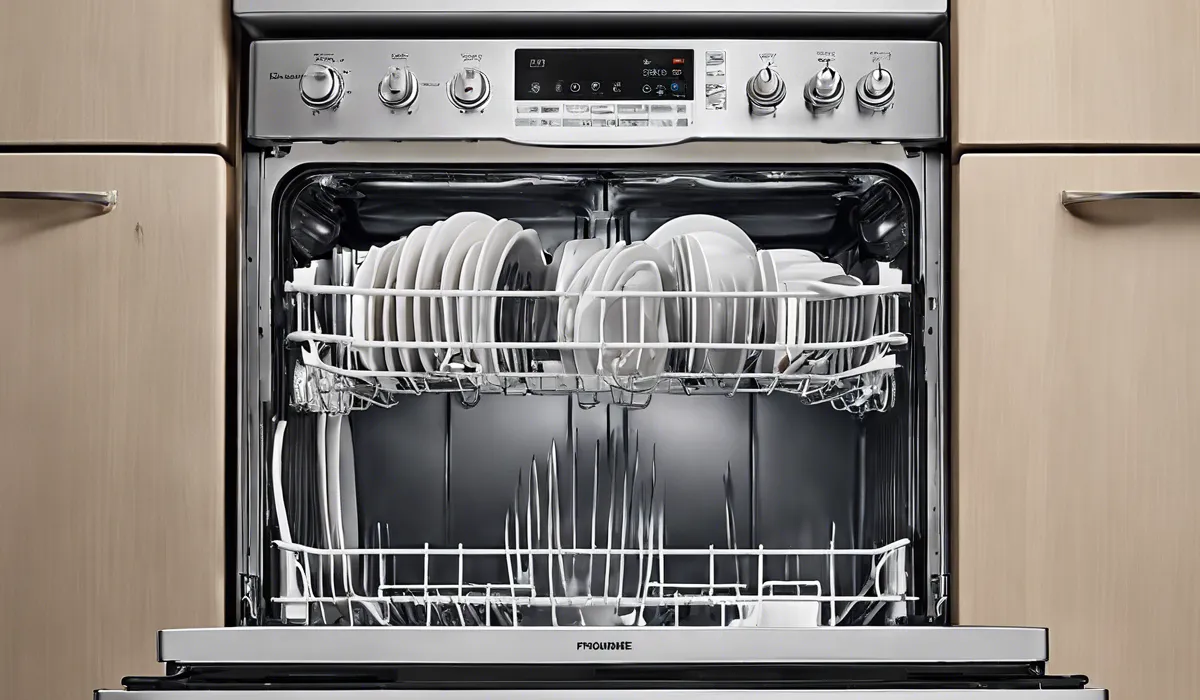How to Drain Dishwasher Frigidaire: Quick Fix Guide
To drain a Frigidaire dishwasher, first, remove any food debris from the filter. Then, set the dishwasher to a drain cycle, or manually press the ‘Cancel’ or ‘Drain’ button. Ensure the sink drain is not clogged, as this can prevent proper draining. If needed, check the drain hose for kinks or blockages.
Step-by-Step Guide to Draining a Frigidaire Dishwasher

Disconnect the Power Supply
Before starting any maintenance task on your Frigidaire dishwasher, it is crucial to ensure your safety.
Unplug the dishwasher from the electrical outlet or turn off the power at the circuit breaker. This step prevents any electrical shocks or accidental activations of the machine while you are working on it.
Remove the Bottom Rack for Access
Slide out the bottom rack to gain clear access to the dishwasher’s drain. This allows you to inspect and reach the drain without any obstructions.
Set the bottom rack aside in a safe area to avoid any damage or water spillage onto your kitchen floor.
Clearing the Drain
Inspect the drain area and remove any visible clogging material such as food particles, glass shards, or other debris that might be impeding water flow.
These can often be the culprits behind poor drainage and can be easily removed by hand or with the help of a pair of gloves.
Deeper Clog Removal
If the clog is not visible or if the drain is still not clear after the initial cleaning, it’s time to use a straightened wire hanger or a plumber’s snake.
Carefully insert the tool into the drain to dislodge any deeper clogs. Do this gently to avoid damaging the drain or the pipes.
Removing Standing Water
In the case where there is standing water that is not draining, consider using a wet-dry vacuum to suck the water out.
This will clear the area and give you a better view of any potential blockages that might have been hidden under the water.
Troubleshooting Tips for Common Draining Issues

Filter Maintenance
One of the most common reasons for a dishwasher not draining properly is a dirty filter. Refer to your Frigidaire dishwasher’s manual for instructions on how to remove and clean the filter.
Rinse it thoroughly under running water and brush off any accumulated debris before placing it back.
Drain Hose Inspection
Check the drain hose for any kinks or obstructions that might be causing drainage issues. The hose should be smooth and free from any severe bends. Also, look inside the hose for any blockages that you can clear out.
Garbage Disposal Checks
If your dishwasher is connected to a garbage disposal, ensure that the disposal unit is clear and running smoothly.
A clogged garbage disposal can often lead to drainage problems in the dishwasher. Running the disposal before starting the dishwasher can help mitigate this issue.
Drain Valve Testing
The dishwasher drain valve should open and close freely to allow water to exit the dishwasher.
If it’s stuck or not operating correctly, it may need to be replaced. This task may require professional assistance if you are not comfortable with more intricate repair work.
Air Gap Verification
If your kitchen sink has an air gap, make sure it is not obstructed. An air gap prevents dirty water from flowing back into the dishwasher and should be kept clear to function effectively.
Preventative Maintenance to Avoid Future Draining Problems

Clean Filter and Drain Regularly
To prevent future clogs and drainage issues, clean your dishwasher filter and drain area regularly. Routine maintenance will ensure that debris does not build up over time, which can cause blockages.
Run Garbage Disposal Beforehand
Make it a habit to run your garbage disposal before starting the dishwasher. This simple practice will help keep the shared drain path clear, thus avoiding backup into the dishwasher.
Avoid Inappropriate Dishwasher Content
Keep food scraps and non-dishwasher safe materials out of your dishwasher. Scrape plates well before loading them and avoid washing anything that could potentially cause damage or blockages in your dishwasher.
Maintain Clear Lines
Using a dishwasher cleaner or a vinegar rinse can help maintain clear water lines and prevent buildup. This simple maintenance step can be done periodically to ensure smooth operation.
Scheduled Inspections
Lastly, consider scheduling periodic inspections of your dishwasher components, including the spray arm, drain hose, and filters.
These inspections can be done by a professional or as part of your home maintenance routine.
FAQs About Draining a Frigidaire Dishwasher
How do I start a drain cycle on a Frigidaire dishwasher?
To start a drain cycle on a Frigidaire dishwasher, set the dishwasher to a drain cycle or manually press the ‘Cancel’ or ‘Drain’ button on the control panel.
What should I do before manually draining my Frigidaire dishwasher?
Before manually draining your Frigidaire dishwasher, remove any food debris from the filter to prevent blockages.
What should I check if my Frigidaire dishwasher isn’t draining properly?
If your Frigidaire dishwasher isn’t draining, ensure the sink drain is not clogged and check the drain hose for any kinks or blockages.
Can a clogged sink drain affect my Frigidaire dishwasher’s ability to drain?
Yes, a clogged sink drain can prevent your Frigidaire dishwasher from draining properly.
How can I tell if the drain hose on my Frigidaire dishwasher is blocked?
To check if the drain hose is blocked, inspect it for kinks or obstructions and ensure it is not pinched or twisted.
Final Thoughts
To effectively drain your Frigidaire dishwasher, start by clearing the filter of food particles. Then activate a drain cycle or press ‘Cancel’ or ‘Drain’.
Verify that your sink drain is clear to facilitate proper dishwasher drainage. If issues persist, inspect the drain hose for any obstructions or kinks that may impede water flow.





